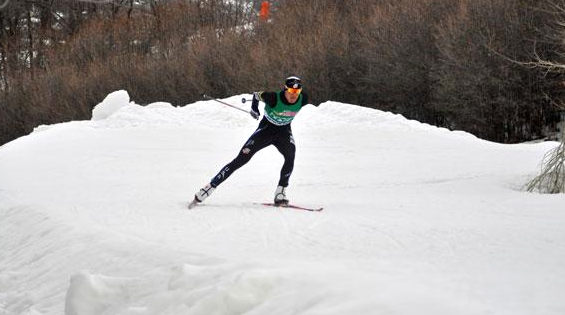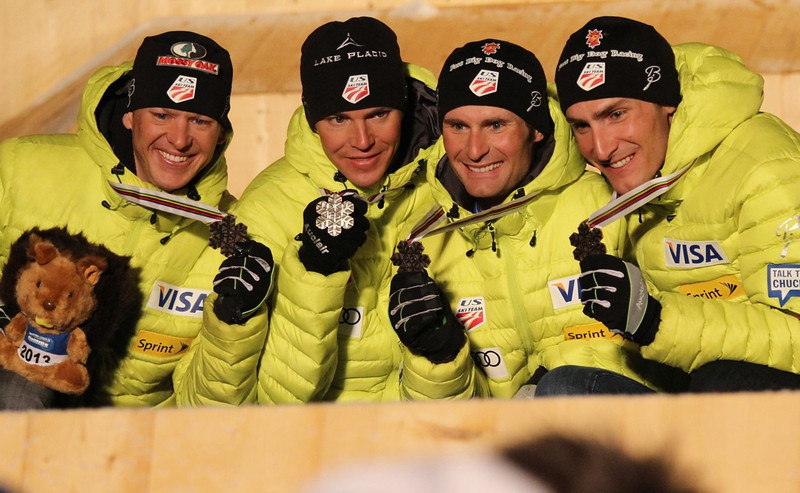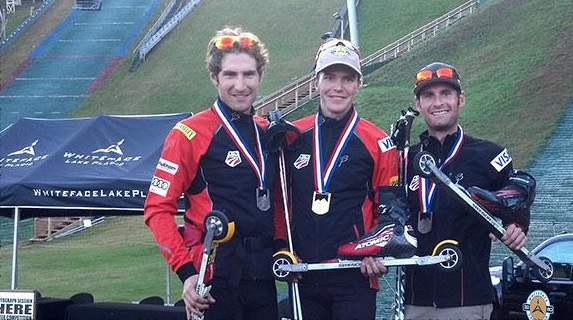
Billy Demong’s doing just fine. The fact that he competed at this week’s Continental Cup in Utah while four of his teammates prepared for this weekend’s World Cup in Schonach, Germany, isn’t a cause for concern for the 2010 Olympic gold medalist.
Demong, 33, needed to take care of business at home in Park City; there was a fifth World Cup spot on the line for U.S. Nordic Combined and someone needed to capture it.
In a phone interview last month, head coach Dave Jarrett explained that Demong was in one of the best positions to qualify for the 2014 Olympics out of anyone on the World Cup team, based on his cumulative results from 2012 and 2013.
The rest of the team, including Bryan and Taylor Fletcher, Todd Lodwick, and Brett Denney, would have to prove themselves worthy of the 2014 Sochi Games in the months leading up to it.
That’s why those four are in Europe, and Demong was sent to take one for the team this week at Utah Olympic Park and Soldier Hollow.
“It’s a little strategic plan to maximize quota spots for the Olympics and World Cup,” Jarrett explained.
Demong did what he needed to, winning two out of three competitions from Tuesday to Thursday (and placing second in the other) to secure a fifth World Cup start for his team.
“It opens up a spot for Brett Denney to be not sitting on his rear-end, not competing at all,” Jarrett said of the B-team member, who earned a trip to Europe with his summer performances.
Denney, 23, joined the A-team in Europe earlier this month in Lillehammer, Norway. He ended up competing in Ramsau, Austria, last weekend, where he placed 15th in the 2 x 7.5-kilometer team sprint with Taylor Fletcher. The Americans’ first team, Bryan Fletcher and Lodwick, placed fourth – a first for U.S. NoCo in that event.
Preceding their recent successes, the first competitions of the season weren’t so smooth. On the opening day in Kuusamo, Finland, none of the Americans made the top 50 in order to compete, and Demong was disqualified for an equipment violation; his suit was too loose around his thigh.

In the four-man team event the next day, the U.S. rose from 12th to seventh thanks to Taylor Fletcher, who skied the fastest anchor leg. The next weekend in Lillehammer, the U.S. notched 10th and 11th with Bryan Fletcher and Lodwick, respectively, and six days later, the two celebrated their unprecedented team-sprint result. On Sunday in Ramsau, Bryan rose to seventh in the individual competition and Demong placed ninth.
Suddenly, it seems like things are back on track for four returners from the 2010 Olympic team, including Demong, who became the first American nordic skier to win gold (in the 10 k large hill competition), and Lodwick, who helped his team (with Demong, and the now-retired Brett Camerota and Johnny Spillane) notch silver in the relay.
Bryan, 27, and his younger brother Taylor, 23, are back, too – this time as veterans. Last season, Taylor led the team in 16th in the World Cup rankings after achieving third for his first podium in Seefeld, Austria. Bryan was the second-leading American in 21st overall. Equally competitive on any given day, Taylor is best known for his superior racing skills, while Bryan has historically been stronger in jumping.
While Bryan has stated he prefers to work on his strengths, Taylor would rather spend more time improving his weaknesses.
“We’re such polar opposite guys, maybe that’s how it works for him, but I feel like I work on my jumping because I’m confident my cross country will be strong,” Taylor said on the phone in October. As a result, his summer training was generally 60-percent jumping, 40-percent skiing.
“Luckily for me I have to focus on cross country, too,” Bryan said in November. “If I’m not jumping two-minutes ahead of those guys, then I have a race on my hands.”
Before the World Cup season, team time trials were a big indicator – and Taylor was happy to win at least two of them. First in the jumps, he didn’t let anyone catch him in the races.
“To do that and know that people behind me are Olympic champions and World Champion gold medalists, that kind of gives you a good feeling and a good focus … that I’m jumping well and I’m skiing well,” Taylor said.
But with teammates like Demong and Lodwick, 37, Taylor’s still the young guy.
“Bryan’s four years older than me so I definitely do get treated like a rookie, but it’s not that I don’t enjoy it,” Taylor said on the phone in October. “I might get frustrated because they’re not listening to me when I might have something worthy to say, but it doesn’t matter to me because Bill knows what he’s doing and everything he does is right. It’s easier to follow him and it should work come this winter.”
Olympic Goals – and Golds
In terms of 2013/2014 aspirations, the World Cup isn’t it. Like most, peaking at the Olympics will be U.S. NoCo’s top priority – and they’re not too concerned with what happens before or after that.

After the Schonach World Cup, the team will head back to the U.S. for Olympic Gold Cup Trials on Dec. 28 in Park City. The winner there will secure an Olympic spot, but it’s not like anybody can make it – racers have to be eligible to compete in the Olympics. According to Jarrett, that narrows the field to 10 or so.
“Nobody is prequalified, everybody has got to earn it objectively,” Jarrett explained. “There is coaches’ discretion for maybe one spot, but that is kind of a force majeure, if we have to use it. We would rather everybody qualifies via the objective criteria.”
Those criteria are based off the top-ranked athletes on the overall World Cup list.
“It’ll be hard to make the Olympic team if you haven’t scored any World Cup points,” Jarrett added. “We have enough competitions – two competitions every week – that if we want to have winners at the Olympics we gotta have guys that can win at the World Cup and at the very least score points.”
On Dec. 28, several men will be gunning for the top spot to ensure their ticket to Sochi, but as Bryan pointed out, it probably won’t be dramatic.
“It’s one of those situations where one of our best guys wins who would already be going to the Olympics, the way it should be, but it is a cool event,” Bryan said. “I remember in 2002 competing [at the] Gold Cup and getting sixth or 11th or something. You feel so close to making that Olympic team that’s such a cool opportunity for the junior kids to feel like, ‘I could rise to the occasion and jump well or ski fast and get myself an Olympic spot.’ It’s a full-on, real competition and all those A-team guys will be certainly trying to perform our best.”
“Dave’s always been big on saying, ‘Compete at your average’ because if you try too hard, it can blow up in your face.’ ” — Taylor Fletcher
Meanwhile, the World Cup will continue while the U.S. A-team races at home then rests up before returning to Europe on Jan. 7. Two weeks later, they’ll fly back to Park City for an pre-Olympic altitude camp, then to Europe again on Feb. 1 for a “mini-jumping camp” in Oberstdorf, Germany. Then, they’ll head to Sochi on Feb. 6.
It might sound like a lot of travel, but Jarrett said it’s all part of their plan.
“Our guys would rather do that then sit in a hotel somewhere in Europe spending all those days away,” he said. “People question strategies, but that is something we’ve been good at doing in the past, so we’ll continue to do that.”
While the US Nordic Ski Team spends the entire winter in Europe, Jarrett said they’d rather go home when they have time between competitions, even if it’s only 10 days.
“On a cost basis, it is somewhat of a wash on lodging,” he explained. “Some athletes don’t want to fly, some athletes would rather stay there, but for the most part all of our guys would rather come home for a little bit and relax.”
Demong and Lodwick both have children at home, which adds to the draw of stateside training and recovery. Taylor said its helped them in the past, allowing for a “mental reset” during a hectic season.
“It’s hard to answer those questions sometimes when the Europeans are like, ‘All you guys care about are the big events and why don’t you target the overall?’ ” Taylor said. “But our goals are the big events and a gold medal.
“The French team, they’ll go home almost every single weekend stay in their own bed for two or three nights, regroup and come back,” he added. “I think that helps a lot to go home and not have the stress of being around your teammates every single weekend. There’s no other team as close as we are.”
In terms of results, Taylor said the team’s been good about keeping them in perspective.
“We’ve always just gotten better as the season goes on,” he said. “Bryan went from top 20 at the beginning of the [2011] season to winning a world cup in Oslo [in 2012].”
Without much fanfare leading up to the 2013 World Championships, the Americans went out and captured their first World Championships team-event medal in third. Earlier in the season, they achieved their first World Cup relay podium in third, “and that was a pretty damn average day for everybody,” Taylor said.
“To know that we’ll be in there on our average day makes the expectations quite a bit less … We know that we don’t have to try so hard to get things done and our performances will allow us to have those results,” he said. “Dave’s always been big on saying, ‘Compete at your average because if you try too hard it can blow up in your face.’ ”
Plain and simple, that’s the team’s goal – to go out and win medals just like they did four years ago in Vancouver. Having never reached the Olympic podium before, the 2010 team captured four medals – at least one in every event – for 44 percent of the available medals. While Camerota retired in the spring of 2011 and Spillane called it a career last April, Lodwick’s embarking on his sixth Olympics and Demong is looking ahead to his fifth.
“I think that we’re on par to be fighting for medals like we were in Vancouver,” Jarrett said. “A lot of teams are the same as they were and a lot of teams are different. It’s hard to say, but I think that we’re in a good spot and I feel good about it. We just have to go out and do it. That’s the main thing.”
Alex Kochon
Alex Kochon (alexkochon@gmail.com) is a former FasterSkier editor and roving reporter who never really lost touch with the nordic scene. A freelance writer, editor, and outdoor-loving mom of two, she lives in northeastern New York and enjoys adventuring in the Adirondacks. She shares her passion for sports and recreation as the co-founder of "Ride On! Mountain Bike Trail Guide" and a sales and content contributor at Curated.com. When she's not skiing or chasing her kids around, Alex assists authors as a production and marketing coordinator for iPub Global Connection.



